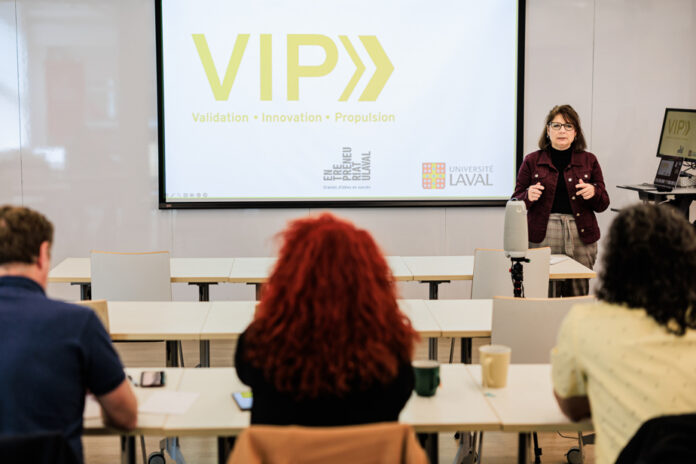In Quebec, young people are twice as likely to want to become entrepreneurs as the rest of the population. But where can they learn how? Incubators, workshops, support, microprograms… Laval and Montreal universities, which both run centers dedicated to entrepreneurship, are pitching in to train the next generation.
Entrepreneurship ULaval, an entity distinct from Université Laval, but which remains linked to the establishment, plays an important role in this regard in Quebec City. Its vocation is twofold: to promote scientific discoveries and research to turn them into businesses or technologies for the market, then to act as a university incubator.
“Our mission is to raise awareness among the entire university community, to awaken it and identify people who want to become entrepreneurs,” explains Simon Chouinard, general director of Entrepreneuriat ULaval.
The organization, which recruits its students through information sessions held every 10 days, offers two programs, each answering a question to properly start a business: do I have a business opportunity with my idea? ? And can I build a sustainable business model?
The first pathway, which aims to validate the business opportunity, welcomes 130 to 140 students per year in cohorts trained for six weeks each. The second, which can be accessed after submitting the predefined deliverables, aims to validate the business model through longer training: 10 to 12 weeks, which attracts 30 to 50 students annually.
“At the end, all participants are invited to participate in the incubation program. We summon them to a jury and we judge those who are in the right place,” explains Simon Chouinard.
“We evaluate their idea and their knowledge of the market, the needs of the market. We assess the commercial potential, the technological maturity, and whether they are willing to devote time and energy to their business. Then we proceed to the signing and development of a roadmap. »
In collaboration with other regional incubators, that of Laval University ultimately leads the incubated companies to generate independent income. The organization also oversees scholarships and collaborates on the university’s entrepreneurial profile, which grants up to 12 credits for courses related to this field in almost all of its bachelor’s degrees.
The University of Montreal is also working in this direction. “For us, there are three components: awareness, training and support,” says Marie-Claude Lemire, senior director of the UdeM Innovation Center and Millénium Québecor.
With the construction of the Innovation Center planned for the coming years, Millénium Québecor has been responsible since its opening in September 2022 for “cultivating entrepreneurship for the entire university community… not just students, but also professors or researchers.” These two establishments replace the outdated UdeM Entrepreneurship Center, which no longer exists.
Currently, two programs are also open and attended in Montreal. Datapreneur is a 16-week course that focuses on artificial intelligence, while Innovinc features a series of three competitions to help aspiring entrepreneurs achieve a certain level of business maturity.
“We are also in the process of developing microcurriculum, online training, credit and non-credit courses. In the awareness component, we have a lot of workshops, conferences, everything that can spark interest in entrepreneurship,” adds Ms. Lemire.
The UdeM training component, on stage, should be operational by fall 2025.















